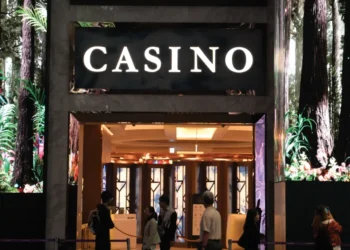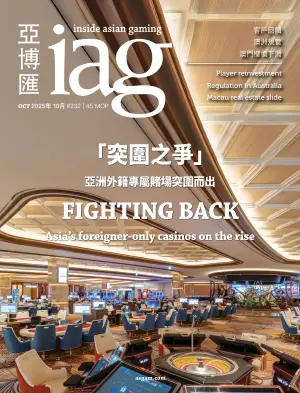Nevada and New Jersey take the lead in developing the US online gaming market
By Charles Anderer
New Jersey officials and gaming executives hope online casino legalization will boost sagging Atlantic City fortunes.
It’s starting to look like a case of history repeating itself. After many years of false starts, legal confusion, soaring hopes and dull resignation, the American online gaming market is set to finally take off, and it’s a pair of bellwether jurisdictions from the old days, Nevada and New Jersey, that are leading the way.
Nevada’s first for-money online gaming site, Ultimate Poker, went live on 30th April and dealt 14 million hands in its first four months of operation. But the potential of online gaming in the Silver State, with its smallish population of 2.7 million people and poker-only (for now) on the menu, is limited. That’s why all eyes are on New Jersey, with its full-scale online gaming law and a population that approaches 9 million. The Garden Sate is working toward a target launch date of 23rd November, and long-term estimates are the market could generate anywhere from US$500 million to $1 billion annually, compared with the $30 million Nevada market presently.
“Everyone feels that they need to be in New Jersey,” said John Kempf, managing director, equity and high yield research, RBC Capital Markets. “What people are saying is they need to be there so they can get involved in other states when they finally do approve online gaming.”
Hope that New Jersey and Nevada could lead to a rapid growth in the number of states legalizing online gaming when legislatures re-convene in early 2014 are fuelled by the prospect of the two jurisdictions combining their respective online markets. “I think it’s likely that in 2014 we’ll see a compact between New Jersey and Nevada,” Jim Murren, chairman and CEO of MGM Resorts International, told Reuters after the company’s second quarter earnings call in early August.
Such a combination could come together fairly quickly, as long as the two jurisdictions keep it simple, said Mark Lipparelli, industry consultant and former chairman, Nevada Gaming Control Board.
“The two markets have high licensing standards and everything starts from there,” said Mr Lipparelli. “If the two jurisdictions decide that it’s OK for patrons located within those states to play on each other’s sites, the first standard is will New Jersey accept a Nevada license and will Nevada accept a New Jersey license?”
Presuming the answer is yes, the two states wouldn’t necessarily have to undertake a process that requires approved games to match up exactly. “I think what you’d have to do is notify the customer and say if you join in Nevada and play a New Jersey site, you’re playing a game that has been validated by the state of New Jersey and those games might have a different validation process than in Nevada. But you agree to that when you log on.”
The questions that will come up are things like taxes, and that’s pretty simple as well, Mr Lipparelli said. If you’re a Nevada resident, you’ll pay the Nevada tax and vice versa for New Jersey residents. “If you’re Station Casinos and you open up in New Jersey, you will have to remit payment to the state of New Jersey,” he said. “In actuality, it becomes fairly straightforward and doable in 2014 as long as people don’t feel the need to completely harmonize the two regulatory regimes. If the primary jurisdictions find a way to work together, then any other state that’s going through the legalization process will be attracted to join in under the same set of circumstances. It will create its own momentum.”

Even in a mobile format, consumers will likely respond best to eGames that closely reflect what they play in a brick-and- mortar casino.
State of Play
If the surprisingly fast run-up to online gaming in the state of New Jersey is a bit of a Hail Mary play in light of the jurisdiction’s seven straight years of significant revenue losses, it appears to be working as well as could be hoped.
“They had to do whatever they could to get a life preserver out there for the casinos in Atlantic City,” said Matt Sodl, co-founder, president and managing director, Innovation Capital. “They will do whatever it takes to reignite interest in the market, and I think online gaming has legs. You’re seeing companies looking to make acquisitions and redevelop properties that were clearly hurting and you’re starting to attract some capital which is what it will take to get gaming companies interested in the marketplace. They have very old assets that need a massive makeover and the only way to do that is to attract capital. Online gaming is a way to do that.”
Indeed, British online gaming company 2Up is reportedly interested in buying a Boardwalk casino (unnamed as of last month) for $330 million. And the news that Wynn Interactive had applied for an online gaming license in August brought with it speculation of a broader move into the market involving a brick-and-mortar presence for Wynn Resorts. Meantime, content and platform providers from around the world are lining up for a New Jersey online gaming license, which is seen a desirable first stop on the road to developing an American online gaming business.
The flip-side of all the interest is that competition will be fierce and margins could well be tight, said Mr Kempf. “I’ve been cautious for a variety of reasons. I think something like this takes time to grow,” he said. “I think it’s all positive and accretive, but I also think the initial margins are going to be surprisingly lower than what people think until the competition sorts itself out. It’s a whole new can of worms for the US; we’ve never done online real-money wagering.”
Mr Sodl is similarly cautious, with the caveat that the industry has no choice but to go all-in. “Online is a necessary evil,” he said. “The old casino model has been to throw up banks and banks of slot machines and let the middle-aged to elderly customers come in and play slot machines. I think that as that age demographic terms out the casinos are going to be forced to find ways to attract and offer games to customers in the up-andcoming demographic.”
Mr Sodl said brick-and-mortar strength won’t necessarily translate into the online space, where he likes “edgier” brands such as Fertitta Interactive’s Ultimate Gaming, with its ties to the Ultimate Fighting Championship brand. “The best thing casinos can do is to leverage the brand equity they have to attract young and up-and-coming folks,” he said. “Ultimate Gaming’s angle is a very smart demographic appeal that will have legs in that world. They’re going to find a lot of success there, and they’ve been very smart to be a first mover. Brands that resonate with the younger demographic, like Hard Rock, are going to do well. It’s not clear to me that Wynn will necessarily resonate. World Series of Poker may have seen its peak; it’s not clear to me that it’s going to resonate.”
Among content and platform providers, there is broad agreement that combining New Jersey and Nevada can’t happen soon enough, and that the coming year will be transformative for their interactive businesses and for the American online market as a whole. Casino Journal talked to Bally Technologies; IGT; Ultimate Gaming; and Williams Interactive. A summary of their views follows:
Bally Technologies
New Jersey will be a major focus for Bally Technologies, which has been chosen as the platform provider for Golden Nugget.
“We have an opportunity; of the licensees in New Jersey, the only operator that does not come out of Europe or was not acquired by an operator themselves is Bally,” said John Connelly, vice president, business development, Bally Technologies. “Golden Nugget is a very strong brand, a good operator and the ownership at Landry’s has an aggressive, forward-thinking team.”
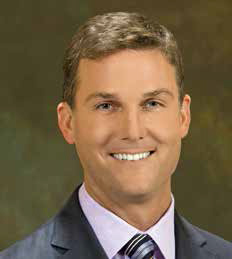
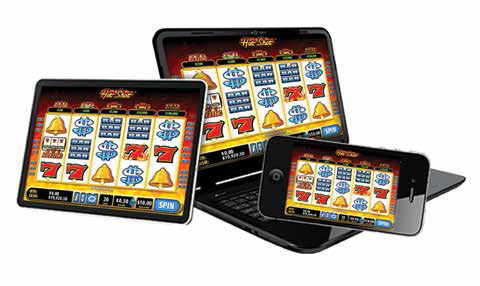
Bally Technologies offers an online gaming solution that can be accessed through most consumer electronic devices.
Mr Connelly noted that in the earlygoing, online initiatives in the US tend to be structured along three different lines; operators that own their own wagering site; operators that contract with a technology provider for a very small percentage of revenue in return for necessary upfront investment; and operators who deploy their own capital. “They have a supplier; they maintain the majority of the profit and they have the capital to launch an online casino,” said Mr Connelly. “Bally/Golden Nugget is an example of that. I think it’s the model that most in the US will gravitate toward.”
Bally sees its ability as the property’s casino systems provider to take the existing player database, be it Golden Nugget or Landry’s, and integrate it into their online platform as a dramatic advantage. “In the online space, one of the greatest costs you have is player acquisition and player retention,” said Mr Connelly. “When you have a database of proven players to whom you have access, you want to be able to utilize that in the online world. We will have the ability and infrastructure to take Golden Nugget’s existing database and save, in our opinion, millions of dollars in player acquisition and retention costs by integrating that into the online platform.”
Integrating the Bally iGaming platform with Golden Nugget’s traditional casino on the floor will result in the creation of “a unique offering” to the players who come to the Golden Nugget online site, compared with what they’re able to obtain at the other Atlantic City sites,” said Mr Connelly. “We will be able to pull their players down into the casino and have the ability to create new loyalties with their existing database of players as they migrate to the Nugget’s handheld and online sites,” he said.
On the content side, Mr Connelly sees America evolving along different lines from Europe, given its starting point with brick-and-mortar operators. “We have signed content agreements with many US operators and in some cases in an exclusive fashion,” he said. “So we’ll be able to supply Golden Nugget content that some of the competitors will not have access to in New Jersey. The products you find on the casino floor are the exact same products people will want to see online. People will demand mirroring of the floor; they will require the same math and the same IP to be present in the online casino. Bally believes the online casinos and traditional casinos should be linked. Even though many people were questioning that, the licenses going forward in the US and Europe will continue to go to traditional operators as they become more educated to the potential revenue, the strategic significance and the similarities between the online world and the traditional world.”
International Game Technology (IGT)
The US is the core market for IGT’s DoubleDown social gaming product, which generated a surprising $61.4 million in revenue via the sale of play-for-fun credits for the quarter ended 30th June. DoubleDown is also the platform being used to launch online gaming in Delaware, the third of three jurisdictions with legal online gaming in the US. The state’s three casinos are set to transition DoubleDown’s online games, currently being distributed through Facebook, from free to for-money in late October.
An interesting question is what happens to the social gaming site when Delaware makes that transition. Robert Melendres, executive vice president, interactive group, IGT, notes that social and for-money gaming have co-existed elsewhere around the world and there’s no reason to assume it can’t happen in the US.
“It’s going to be the operator’s decision in Delaware; we do think the markets can co-exist based on what’s happening around the world,” said Mr Melendres. “If you look at the top markets for social casino, there’s the US, Brazil and Australia, none of which have legal online gambling. But the UK is also in the top five and there’s gaming everywhere there; on every street corner, and you can even gamble on your mobile phone. Also, in the US, one of the hottest areas for DoubleDown is Nevada. Maybe people are practicing or it’s a combination of a number of things.”
Delaware made the decision to open up its online market by going through DoubleDown first because it’s “very complimentary to a real gaming experience,” said Mr Melendres. “Players are able to get familiar with it and if they really enjoy it, try it for real.”
He added that embedding DoubleDown into a casino website carries with it three value propositions: reach, retention and revenue. By reach, DoubleDown allows properties to engage with the customer with authentic casino-style games even when they’re not in the casino. By retention, it allows them to market to customers, provide incentives and give them reasons to come back into the casino. Revenue is realized both when they come back and with a revenue-share arrangement on the Web.
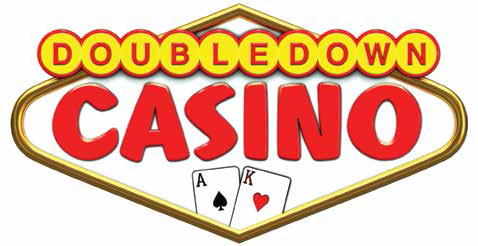
“If you look at social gaming generally or Facebook, the US is the top market, there’s a huge appetite for our type of games,” said Mr Melendres. “Even though our games are offered for fun, they are authentic games. One of the successes for IGT and DoubleDown is we made the decision to offer the exact games that are offered on the casino floor in regulated markets. People love having the same game, something that they’ve played in a casino. The games have the same math, same volatility, and the same experience.”
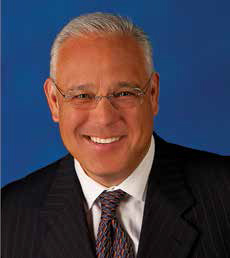
Mr Melendres is bullish on New Jersey from an IGT perspective, and for the potential of a combined Nevada/New Jersey market. “We expect New Jersey to be $300 million in size, quickly,” he said. “It’s a good, big market. IGT has the largest authenticstyle online games. Half of the games on the floors in New Jersey are IGT machines. We are able to offer the same games to our players in New Jersey online on Day 1. We were always hopeful that there would be a federal solution but it just hasn’t come to fruition, so we’ll take state-by-state. This idea of Nevada and New Jersey entering into some sort of a compact is the right thing to do. From a business perspective, it’s an important move.”
Ultimate Gaming
About 11 years ago, Tom Breitling and his partner Tim Poster, the then-owner of the Golden Nugget in downtown Las Vegas, and Frank and Lorenzo Fertitta of Station Casinos were operating separate businesses but thinking along very much the same lines. Both were in the brick-and-mortar business, and along with a number of other big names in the industry such as MGM, getting ready for the next wave of expansion, which was to surely come via the Internet. In 2001, the Nevada legislature adopted a law permitting the Nevada Gaming Commission to license Internet gaming businesses to operate wholly within the state, an initiative that was killed the following year when the Department of Justice wrote that such businesses would be in violation of federal law.
“Our vision was to buy the Golden Nugget and I was going to run the online version and Tim was going to run the brickand- mortar,” said Mr Breitling, whose first business venture with Mr Poster was an online travel service company they sold to Expedia. “And then, when that letter came out we said, ‘OK, we’ll just focus on the bricksand- mortar for now.’ Every intention we had was bricks-and-clicks and we thought we were going to be at the forefront.”

Ultimate Poker launched Station Casinos’ online poker brand in April.
Eleven years later, now chairman and co-founder of Ultimate Gaming, Messrs Breitling and Poster, along with the Fertittas, are all very much at the forefront of change. Fertitta Interactive, which is majorityowned by Station Casinos, owns both Ultimate Gaming and the Ultimate Fighting Championship (UFC) mixed martial arts brand. Ultimate Poker launched as Station’s online poker brand tied to 16 Station, Wildfire and Fiesta casinos at the end of April. “In the first four months, we dealt over 14 million hands, proving there is pent-up demand for the activity,” said Mr Breitling. “We’ve just launched the second version of our product, with 60 new features and enhancements. We’re proving that players can be protected while generating revenue for the state; and even though it’s a state of 2.7 million people and poker is a small piece of it, there is pent-up demand for the activity and the timing is right.”

Tom Breitling, chairman and co-founder, Ultimate Gaming
Mr Breitling said that Ultimate Gaming, as a brand, has the same characteristics of the UFC, but it’s a complete standalone brand. “It was driven by the DNA of both companies; Station Casinos and the UFC,” he said. “UFC is the fastest growing sport in the world; it completely understands the 21-45 year-old ‘super-consumer’ who loves sports and games and embraces technology. It’s a demographic with $200 billion-plus in spending power. There’s a powerful marketing engine behind UFC that we think provides great synergy with Ultimate Gaming and our product offering. And of course you have Station Casinos, with its long history of leadership in gaming experiences in a regulated environment.”
Ultimate’s customers are playing online and in the casino; nearly 50% are going into Station Casinos properties, depositing, withdrawing and playing games there, and land-based poker revenues were up 5% in June.
In New Jersey, Ultimate has partnered with the Taj Mahal, which for the last several decades “has been the place to play poker up and down the East Coast,” said Mr Breitling. “It was also the site of the very first UFC card after Frank and Lorenzo bought the company in 2001. We are operating to meet the DGE deadline of 23rd November and we fully hope to be the first to launch. The northeast corridor is a much different gaming marketplace than Nevada. Our job is to bring our product to New Jersey.”
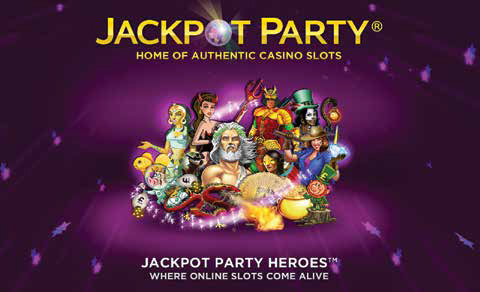
Williams Interactive has gained valuable insight about online gaming through its Jackpot Party gaming sites in the UK and Belgium.
If Nevada and New Jersey could form an agreement to work together, it would set the tone for the rest of the country, said Mr Breitling. “These are two leadership states. The other states are absolutely interested in the tax revenue that would be generated by Internet gaming and players want to be protected. It’s also critical for building liquidity. If you have a guy in rural Nevada who just worked the night shift and doesn’t want to drive 45 minutes to go to a casino, there probably aren’t a lot of games going on online in just Nevada at that time. At 8 a.m. in New Jersey, there may be more online poker games going on at that time so he can get the game that he wants if the two states work together to pool liquidity. The same holds true for the player in New Jersey at 3 a.m. It’s a win for the states and for the players.”
Williams Interactive
Williams Interactive will bring a wealth of online gaming experience and operator relationships to New Jersey, where it has applied for a master supplier license. In addition to online operations and managed services, which includes its own online casino in the UK (jackpotparty.com); Williams has a depth of experience in game servers and distributing content to suppliers, and a strong level of knowledge around the social casino through its jackpotpartycasino.com on Facebook.
“We have a depth of knowledge that other suppliers don’t given that we’ve operated our own casino in the UK for four years,” said Bob Hays, vice president and managing director of B2B at Williams Interactive. “Whether that’s at the top end relative to marketing requirements; player acquisition, retention, CRM and business intelligence… we’ve done that all ourselves and been successful doing it. We’ve continued seeing that success extended to our first b-to-b opportunity with Groupe Partouche in Belgium.”
Groupe Partouche has given Williams Interactive some insights which will be very valuable in the US, said Mr Hays. Nearly 75% of the online players there are also playing in the brick-and-mortar casino. Half of those folks are visiting the casino at least quarterly and many of those on a monthly basis.
“Even more interesting to us as a content provider is that the majority of the players are looking to play the same games online that they play offline in the brick-and-mortar casino,” said Mr Hays. “For the brick-andmortar casino,” said Mr Hays. “For the brick-andmortar operators, it’s going to be important that they have a single view of the player across these channels, given that a high percentage is moving back-and-forth. Brickand- mortar knowledge of what games are working will translate to the online space.”
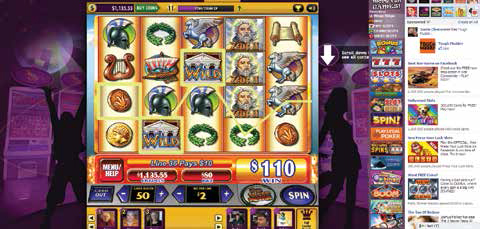
Zeus II as featured on Jackpot Party Casino, a Williams Interactive property.
New Jersey is a great opportunity for Williams Interactive, enabling it to develop its core strategy of distributing content across multiple markets, channels and platforms. “It also allows us to grow and expand our existing relationships, not only with our land-based operators that have a presence in Atlantic City, but also our Europe-based customers that will be entering the US market for the first time in the form of supplier relationships and platform providers,” said Mr Hays. “Lastly, it is a chance to develop our online capabilities, but specifically to the US, which is likely to grow to be a large market with different characteristics and requirements than the European market, which didn’t rise from land-based operators extending their operations into the online space. It really started with sports book, and then moved to poker, casino and bingo. Many of the operators there don’t consider land-based operations and player relationships with respect to their operations. We believe we’re very well-positioned to work within the US environment given that WMS has for many years had deep and strong relationships with the land-based operators as a supplier of game content.”













